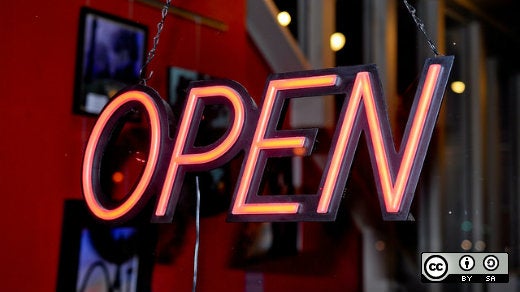At Opensource.com we compare page views for various topics, which gives us some insight into what people were interested in reading about and talking about this year. In addition to a ton of discussions about tools for automating or customizing your DevOps game, some interesting trends—some perennial, and some not—emerged for people who ponder both the business side and the tech side of things.
"Doing" open source
The first thing that became obvious is that more and more people and companies are asking something akin to: "What's the deal with open source?" Luckily, many savvy folks in our community are stepping up to provide useful answers to these queries and still more are reading and sharing these kinds of topics.
If you're pondering whether or not to make something you or your company built available under a free or open source software license, let Duane O'Brien help you understand what your social responsibilities are when you release code to the world. While longtime practitioners understand that moving to open source is a little more complicated than code and a license, newer players can save themselves a lot of time by reading this article.
Code is not going to license itself, contributors aren't going to magically appear, and legal issues will apply whether you're aware of them or not. John Mark Walker discusses how to do it correctly and holds up Google's Open Source Programs Office as one that other companies should consider emulating.
Well-known FOSS guru, Stephen Walli, shared 12 open source memes. They're more like rules to live by than memes, and they should probably be made into calendar. This one should be read by anyone who is currently managing or implementing the open source policy at their workplace.
So much data
Another thing we talked about in 2016 is how to manage ever-increasing volumes of data. The sheer number of different project management tools available proves that there is no one true way to turn a large volume of data into actionable directives. Continual improvement by a vast community in need of endless options for customizing? Sounds like a job for free software to me.
Our resident expert, Robin Muilwijk has been covering this topic for several years. In 2014, there were five freely licensed project management tools. In 2015 he wrote about five new ones and this year he discussed eleven, and even then our readers suggested still more open source project management tools in the comments.
Data management isn't the only problem in need of customized attention, storage is getting trickier too. OwnCloud's collaboration with CERN and AARNET is a fantastic example of a FOSS storage solution working directly with a very prolific data creator. Perhaps in 2017 we'll see more innovators that aren't primarily focused on software working closely with software builders to get exactly the right solution for their complicated needs.
Tinkerers are still crucial
More large companies are embracing open source every year, but smaller projects and individual tinkerers still have a vital role to play. The popularity of tiny, general-purpose computers and ubiquity of models for building all kinds of projects means that tinkering is more accessible than it ever was.
Scott McCarty takes a look at the way Arduino helps people experiment in his piece What containers and unikernels can learn from Arduino and Raspberry Pi. He sees a lot of possibilities for individual developers who want to test specialized approaches using a roll-your-own unikernel. Certainly, developers will face challenges when applying these custom approaches at scale, but for now blending the container approach and DIY kernel strategy seems full of possibilities.
The use of free and open source hardware (FOSH) has revolutionized the nonprofit world's ability to bring assistance directly and more affordably to people needing aid. Overall, individuals and nonprofits are using custom-printed objects to innovate to solve less profitable problems, addressing more on the "long tail" of their issues list, if you will. Joshua Pearce looks at how to calculate the ROI for free and open source hardware, a mission-critical process that you need to do to turn your small project into a big one that makes a big difference.
On companies and communities
Our licenses and development models have always sparked heady philosophical discussions, and none more so than John Mark's piece on free software and open source. He compares the goals and impact of open source businesses with those of free software activists. What do companies owe the community? Are their goals aligned enough? He clearly struck a nerve because seemingly everyone who read this piece had an opinion about it.
The websites that host the Sourceforge and Slashdot communities changed hands this year. Rikki Endsley took a look at what it means when selling a website means selling a community. If the new stewards don't honor the community's contributions while making the site profitable, they may find that they don't really own the spark that makes it valuable. In Rikki's interview with Logan Abbott, president at SourceForge Media, LLC, he makes clear that he is aware of the challenge.
Getting a handle on security
Security is a perennial concern for Opensource.com readers—a quick search on the site yields over 900 results. Free software is a natural ally for anyone who is concerned about controlling their data and online presence. This year we covered several specific tools for managing users' privacy and security.
Alex Juarez does a deep dive on what users can do from the command line to prevent break-ins on their Linux system.
Ricardo Frydman recognizes that asking people to manage passwords for dozens of sites is cumbersome to say the least. He does a great job of laying out how the Keepassx password manager and generator can help.
Benjamin Kerensa interviewed Brendan Eich for his Open Web column. They discussed the new privacy-focused browser Eich is working on, called Brave. The former Mozilla CEO sees a real need for a browser that serves its end-users rather than advertisers.
Help wanted
With interest in open source at an all-time high, groundbreaking projects capturing the zeitgeist, and schools teaching and embracing the open source mindset, the number of people who want an open source job has spiked. Stories about how to get one have always been very popular on the site, and 2016 was no exception.
Jono Bacon offers a little navigational advice to those who are new to open source work culture. He stresses the importance of maintaining the momentum to upgrade or add to your skills, technical and otherwise. Becoming a valuable person and resource as part of a concerted in-person networking effort within the free software community is also necessary, he writes.
Jason Baker gets a little bit more specific with 10 precise skills job-seekers will need and where exactly to look for openings.
While coding is important, you don't have to program to get a job at a company that uses free and open source software. Nithya makes six essential suggestions for non-coding careers.
Finally, Emily Dunham offers essential practical advice for adding open source skills to your resume.
Wrapping up
From the big philosophical questions all the way down to the nitty gritty, we talked about it. If you've got something to say about open source jobs, great new tools, or news in free software, why not say it here? Maybe your article will be the one we're all talking about next year.







Comments are closed.